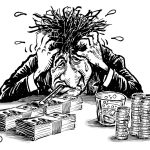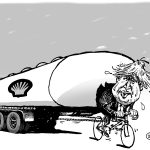China – EU, the arrangement?
What benefit can Europe really expect from the investment deal with Beijing?
What was the EU going to do in this mess? It is roughly in these terms that one could describe how was perceived the investment agreement signed at the very end of last year between China and the European Union. The fruit of several years of negotiations, it has been presented as the high point of Angela Merkel’s European presidency, and the legacy of the outgoing Chancellor, as well as the means for China to “break” the isolation into which the United States seemed to have pushed her.
Criticisms have multiplied both in substance and in form. The deal would not go far enough in rebalancing relations between the two entities, as China has made only meager concessions – sometimes even as in the case of forced labor, which was deemed derisory – while it is guaranteed access to the European market and an opening up to the energy market from which she feared being banned. For its part, the European Union is accused of sacrificing its fundamental principles on the altar of trade. Since last December 30 (the day of the signature), the repression has intensified in Hong Kong and Europe’s demands for the release of recently condemned opponents have gone unheeded. Moreover, the European Parliament, which must ratify the agreement, may well take up this issue to reject the whole project.
Thus, on the eve of Joe Biden taking office, China would have somehow found a way to drive a wedge into the Atlantic Alliance, one more victory over America entangled in the pandemic and overwhelmed by an opposition on the brink of insurrection.
Considering the pandemic crisis, how can we imagine that China will be more transparent and loyal?
A fool’s deal then, for a Europe that is far too weak? It’s a fact that the game of chess, or rather of Go that is being played, seems to be off to a bad start on the Western side. This agreement is symptomatic of the current state of international and world trade relations, which have become conflictual in many areas, and encompass issues way beyond the purely mercantile framework.
Both the European Union and China are major players in world trade. According to Eurostat1, in 2018, the EU-27’s external trade in goods represented just over 3.9 trillion euros, i.e 50 billion more than China and 340 billion more than the United States – the EU being a net exporter. China has also become the European Union’s biggest trading partner. This means that she is unavoidable and cannot be kept out of the global circuits. Through the agreement reached in December – on the table since 2013 – Europe therefore intends to obtain from China a better access for investments by her companies in sectors such as finance, industry, telecom and some services. China has also pledged to reduce greenhouse gas emissions, thus entering into the framework of Cop 21. A promise of cooperation and rebalancing that is undoubtedly difficult to ignore.
But these relationships are tinged with growing mistrust. Considering the pandemic crisis, how can we imagine that China will be more transparent and loyal? And how can we reconcile the principles of respect for human rights which the EU stands for, with the need to secure trade opportunities? The European Commission insists on the establishment of a regular arbitral dialogue and in any case retains the means to unilaterally implement sanctions in case of non-compliance with the commitments made. Doesn’t the Brexit marathon give her some credibility in terms of her ability to lead and maintain a united front? By this agreement, has Europe moved away from the United States? The triumphalism of the Middle Kingdom is certainly premature and exaggerated. Europe has experienced other periods of trade skirmishes with America, but it has not separated from them. Nevertheless, recent events have raised fears that the new President will be monopolized by domestic issues. Yet it will be up to the two traditional allies to rethink and rebuild international trade relations, whose institutions have been undermined by the Trump administration.
The growing weight of China in global direct and financial investments can only encourage both countries to find ways and means of more balanced strategic and trade relations.
In this area, the European Union also has arguments to make.
1 «International trade in goods» Eurostat June 2020
Original french version article in allnews.ch Dated January 12, 2021 Cartoon Barret



